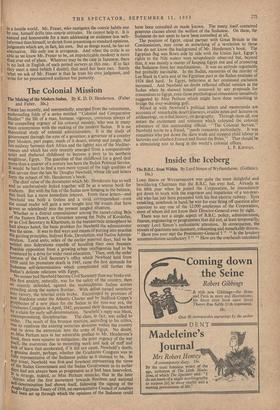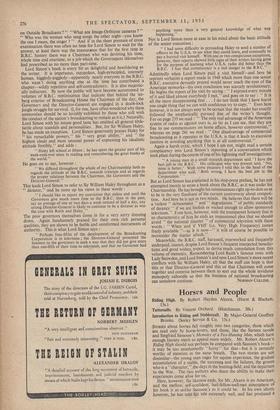Inside the Iceberg
LORD SIMON OF Wrinmsnawa was quite the most delightful and bewildering Chairman that the B.B.C. has ever had. Already in his 68th year when he joined the Corporation, he immediately got down to work with the eagerness and impatience of a ten-year- old who has just been presented with his first electric railway. Eyes twinkling, notebook in hand,'he was for ever firing off question after question to any one of the 12,000 employees of the Corporation, most of whom did not know their Director-General even by sight.
There was not a single aspect of B.B.C. policy, administration, finance, engineering or programmes that did not, at least temporarily, occupy Lord Simon's enthusiastic attention. In consequence, the stream of questions was incessant, exhausting and remarkably diJerse. " Have you ever met the Postmaster-General ? " " Is the lavatory accommodation satisfactory ? " " How are the overheads calculated on Outside Broadcasts ? " "What are Image-Orthicon cameras ? "
" Who was the woman who sang songs the other night—you know the one I mean, the singer ? " And if in the sheer pressure of cross examination there was often no time for Lord Simon to wait for the answer, at least there was the reassurance that for the first time in B.B.C. history there was a Chairman who was devoting his time, whole time and overtime, to a job which the Government themselves had prescribed as no more than part-time. Lord Simon's book is every bit as delightful and bewildering as the writer. It is impetuous, outspoken, high-principled, intensely human, higgledy-piggledy—apparently nearly everyone in the B.B.C. who wasn't doing anything else at the time has contributed a chapter—wildly repetitive and self-contradictory. It is also majestic- ally indiscreet. By now the public will have become accustomed to volumes of B.B.C. reminiscence that indicate that behind the ice- berg exterior of Broadcasting House the Chairman of the day, the Governors and the Director-General are engaged in a death-lock jungle struggle for survival. (I, for one, have often wondered why these , animosities should be so lavishly exhibited by those who still wish the conduct of the nation's broadcasting to remain as it is.) Naturally, Lord Simon with his innate good taste has omitted all general tittle- tattle about scandals and personalities. But, for Sir William Haley, he has made an exception. Lord Simon generously praises Haley for " his remarkable powers," his " very great ability," and " the highest ideals and most unusual power of expressing his idealistic attitude forcibly," and adds :
" Haley left school at fifteen ; he has spent the greater part of his week-ends ever since in reading and remembering the great books of the world."
He goes on to say, however :
" We differed throughout the whole of my Chairmanship both as regards the attitude of the B.B.C. towards criticism and as regards the proper relations between the Chairman, the Governors and the Director-General."
This leads Lord Simon to refer to Sir William Haley throughout as a " dictator," and he sums up his views in these words : " 1 should like to report my conviction that unless and until the Governors give much more time to the B.B.C. than in the past,
say an average of one or two days a week instead of half a day, any strong Director-General is likely to continue to be a dictator as was the case with Reith and Haley. '
The poor governors themselves some in for a very sorry dressing down. Again handsomely praised for their own rich personal qualities, they are shown to be feeble and uninformed instruments of authority. This is what Lord Simon says : " Perhaps four-fifths of the development of the Broadcasting Corporation is in television ; the Director-General presented the
business to the governors in such a way that they did not give more than one-fifth of their time to television, and that no Governor had
' anything more than a very general knowledge of what was happening."
Nor is Lord Simon more at ease in his mind about the basic attitude of the senior executives : " 1 had some difficulty in persuading Haley to send a number of officers to the U.S.A. to see what they could learn, and eventually to pay a hurried visit himself. With one or two conspicuous exceptions, however, their reports showed little signs of their writers having gone for the purpose of learning what U.S.A. radio did better than the B.B.C. I fear that complacency is a real danger to the B.B.C."
Admittedly when Lord Simon paid a visit himself—and here he reprints verbatim a report made in 1948 which more than one senior B.B.C. executive. devoutly prayed would never reach the eyes of the American networks—his own conclusion was scarcely revolutionary. He begins the report of his visit by saying : " I enjoyed every minute of it and liked almost everybody I met,' and goes on to say : " It is all the more disappointing that . . . I do not think that I have learnt one single thing that we can with confidence try to copy." Even here. however, it is not always easy to be certain that the reader has exactly followed the emphatically pursued line . of the writer's thought. For on page 235 we read : " The only real advantage of the American system of radio as against ours is, so far as I can see, that they are free to use commentators on home affairs, however controversial," whereas on page 241 we read : " One disadvantage of commercial broadcasting as it operates in the U.S.A. is that it leads to excessive caution in avoiding anything that is at all controversial." Again a harsh critic, which I hope I am not, might read a certain complacency into Lord Simon's reporting of a conversation which took place during the course of one of his lightning staff investigations: " A young man in a small research department said I have the best job in the B.B.C.' His colleague who was present said, ' No, mine is better.' With some pleasure I told this to the head of the department who said, ' Both wrong, I have the best job in the Corporation.' " But as Lord Simon has explained in his stop-press preface, he has not attempted merely to write a book about the B.B.C. as it was under his Chairmanship. He has brought his reminiscences right up-to-date so as to be in the very forefront of the current controversy about competi- tion. And here he is not in two minds. He believes that there will be a violent " debasement " and " degradation " of public standards of decency " if we are, foolish or wicked enough to allow sponsored television." Even here, however, with the transparent honesty that is so characteristic of him he ends an impassioned plea that we should avoid " the national disaster " of commercial television with these words : " When and if VHF (i.e. Very High Frequency) comes freely available "—as it is now—" it will- of course be possible to reconsider the matter afresh."
Meanwhile, the B.B.C. staff, harassed, overworked and frequently underpaid, cannot, despite Lord Simon's frequent interjected benedic- tions and good wishes, expect to derive much consolation from this volume of memoirs. Remembering Lord Reith's famous rows with Lady Snowden, and Lord Inman 's and now Lord Simon's more recent ' conflicts with Sir William Haley, all that the staff can hope is that this or that Director-General and this or that Chairman will come together and contrive between them to sort out the whole invidious monopoly caboodle so that the business of national broadcasting



































 Previous page
Previous page